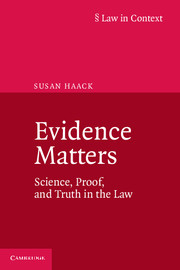Book contents
- Frontmatter
- Epigraph
- Contents
- Acknowledgments
- Introduction: A Pragmatist Perspective on Science, Proof, and Truth in the Law
- 1 Epistemology and the Law of Evidence
- 2 Epistemology Legalized
- 3 Legal Probabilism
- 4 Irreconcilable Differences? The Troubled Marriage of Science and Law
- 5 Trial and Error
- 6 Federal Philosophy of Science
- 7 Peer Review and Publication
- 8 What’s Wrong with Litigation-Driven Science?
- 9 Proving Causation
- 10 Correlation and Causation
- 11 Risky Business
- 12 Nothing Fancy
- Cases Cited
- Statutes, etc., Cited
- Bibliography
- Glossary
- Index
- References
8 - What’s Wrong with Litigation-Driven Science?
Published online by Cambridge University Press: 05 August 2014
- Frontmatter
- Epigraph
- Contents
- Acknowledgments
- Introduction: A Pragmatist Perspective on Science, Proof, and Truth in the Law
- 1 Epistemology and the Law of Evidence
- 2 Epistemology Legalized
- 3 Legal Probabilism
- 4 Irreconcilable Differences? The Troubled Marriage of Science and Law
- 5 Trial and Error
- 6 Federal Philosophy of Science
- 7 Peer Review and Publication
- 8 What’s Wrong with Litigation-Driven Science?
- 9 Proving Causation
- 10 Correlation and Causation
- 11 Risky Business
- 12 Nothing Fancy
- Cases Cited
- Statutes, etc., Cited
- Bibliography
- Glossary
- Index
- References
Summary
If Science, for a consideration, can be induced to prove anything which a party litigant needs in order to sustain his side of the issue, then Science is fairly open to the charge of venality and perjury, rendered the more base by the disguise of natural truth in which she robes herself.
–John Ordronaux (1874)Because the factual truths at issue in a case often go beyond what the average juror can be expected to know, courts have come increasingly to rely on expert witnesses, among them scientists from just about every specialty you can think of: experts on blood, bullets, bite-marks, battered wives; on PCBs, paternity, poisons, post-traumatic stress; on radon, recovered memories, rape trauma syndrome, random DNA-match probabilities; on psychosis, asbestosis, silicosis (and for all I know, on psittacosis!). But as long as courts have relied significantly on scientific witnesses, there have been complaints: about the scientific ignorance and gullibility of attorneys, judges, and jurors; about “witness-shopping”; and–as my opening quotation illustrates–about the irresponsibility and venality of professional scientific experts willing to say whatever is needed to advance the cause of the party that hires them. And as reliance on expert witnesses has grown, so has the felt need for courts to ensure that the expert testimony admitted is not just flimsy or interested speculation, but reliable enough to be more helpful than misleading.
- Type
- Chapter
- Information
- Evidence MattersScience, Proof, and Truth in the Law, pp. 180 - 207Publisher: Cambridge University PressPrint publication year: 2014



